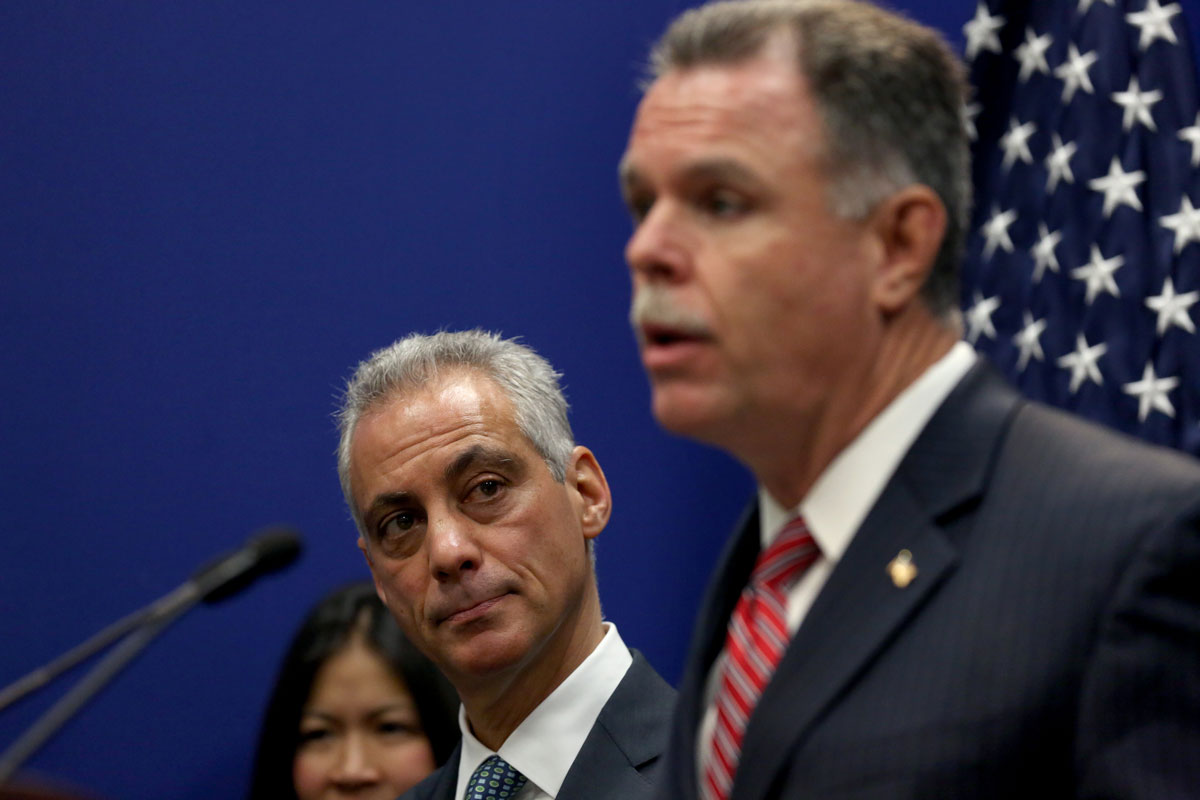Despite growing use of the #ResignRahm hashtag on Twitter and a handful of columnists calling for his resignation, Mayor Rahm Emanuel will almost certainly survive his second term. Nonetheless, his reputation, his authority, and his ability to inspire fear in agency heads and City Council members will diminish after the city released the dash-cam video of the fatal shooting of Laquan McDonald last week.
“Rahm the Impaler,” the headline of a February 2014 profile of the mayor in Esquire, no longer fits. It may have been police superintendent Garry McCarthy who lost his job Tuesday, but it's Rahm who stands to lose the most.
McCarthy will likely move into a cushy Rudy Giuliani–like job in private security. Mike Sneed reported today that McCarthy had been in contention to become “head of security for a national sports league.” He passed on that one, but there will be others.
Cook County State’s Attorney Anita Alvarez, another target of ire in Chicago right now, could lose in the primary next March, but she has a long record as a prosecutor and could easily transition to a cushy law firm partnership.
So that leaves Rahm. In the public mind, even before the evidence is all in, Rahm morphs from America’s most famous mayor into an illegitimate second-termer, one who, had the video of McDonald’s horrific death in October 2014 been publicly aired in the weeks after it occurred, most likely would have lost crucial African-American support and therefore lost the runoff election to Chuy Garcia.
Do we know that Rahm had his reelection in mind and deliberately conspired to delay the video? No, but the city’s lawyers did go to court to prevent the release of the gut-wrenching film, claiming that its public airing would compromise the investigation.
Until now, Rahm has pretty much rammed whatever he wanted through the City Council, easily winning with fat margins, even when the issue at hand was a huge property tax increase. Two months ago, when members of the City Council’s Black Caucus called for McCarthy’s firing, Rahm ignored them. That all changed after the video’s ridiculously tardy release—400 days after McDonald’s death. Will aldermen be as willing to follow the mayor’s marching orders going forward?
Rahm has long been a subject of fascination and gushy treatment in the national press, and he has done all he could to encourage that. Not this week. He was front-page news in the New York Times, the Washington Post, and the Wall Street Journal. But it wasn’t the good news to which he has become accustomed.
Take the New York Times: On Monday, an op-ed by Bernard Harcourt, a professor of law and political science at the University of Chicago from 2003 to 2014, called on Rahm to resign. Today, a Times editorial called McDonald's killing an “execut[ion]" and went on to detail a “cover-up that began 13 months ago,” noting it “might well have included highly ranked officials who ordered subordinates to conceal information. … Mayor Rahm Emanuel demonstrated a willful ignorance. … Officials must have known what was on that video more than a year ago. … The Justice Department … needs to investigate every aspect of this case, determine how the cover-up happened and charge anyone found complicit.” The editorial writers also noted that the video “might have been buried forever had lawyers and journalists not been tipped off to its existence. Mr. Emanuel, who was running for re-election at the time … fought to keep it from becoming public.” The editorial doesn’t leave much to the imagination.
Some people and outlets, including Al Sharpton and Crain’s Chicago Business, have even called for a special prosecutor. To suggest that Rahm has enough on his plate without someone nosing around is an understatement. On top of that, Illinois Attorney General Lisa Madigan wrote a letter yesterday to Attorney General Loretta Lynch asking for an independent federal investigation.
Next week, the Chicago Teachers Union, whose leader, Karen Lewis, urged members to join protests across the city on Black Friday, will stage a strike vote. Rahm hasn’t yet persuaded Gov. Bruce Rauner to give him the money he needs to avoid the crippling firing of teachers and slashing of programs. The pension mess remains unresolved. The city’s credit rating has cratered. Rahm's property tax increase will soon hit Chicagoans. In short, Rahm had enough problems before he asked for McCarthy's resignation.
The mayor has long denied he wants to hold national office, be it the vice presidency, the presidency, or even an important cabinet position. True or not—I’ve always believed not—what happened on that October night and its aftermath removes him from the list of White House contenders. Even if he were to settle for a cabinet job—say HUD or Secretary of Health and Human Services—imagine his Senate confirmation hearings and the questions about the terrible death of a black teenager at the hands of a white cop who had a record replete with citizen complaints of excessive force and racial epithets.
Rahm has suggested there’s a third term in his future. Unlikely, in my opinion. The public’s attention span is short, but not that short. (He had a $25,000-a-head fundraiser scheduled for next week, but by late this afternoon it had been canceled.)
And this story isn’t going away. Questions remain about 86 minutes of missing video from a Burger King near the shooting, and the trial of police officer Jason Van Dyke is sure to be sensational, sad, and disturbing.
Rahm Emanuel was once considered the most effective, fearless mayor in America. But as Neil Steinberg—the same guy who wrote the admiring Emanuel profile for Esquire —wrote Tuesday in the Sun-Times, that “myth is definitely toast.”



